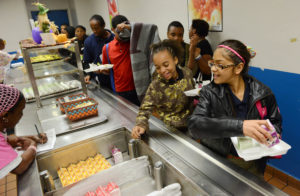
Though all the economic indicators point to a robust recovery from the serious economic blow the recession delivered to the nation, research has shown that the middle class is recovering at an extremely slow rate—with some arguing that the middle class hasn’t recovered much at all.
That has forced many families to struggle to provide meals for their children and forced many parents to have to work longer hours at their jobs.
It’s a situation that has led to many students being left on school campus hours after the last class has dismissed; others are left going to bed without having a sufficient third meal.
For these reasons, offering free dinner or an after-school snack has become a soaring trend in some of the largest school districts in the country.
One report indicated that the second largest school district in the country is planning to double the amount of students that receive free dinner and is considering extending the free dinner program to all Los Angeles schools.
School officials say that the program is not only helping to keep students happy and healthy but it’s also helping them perform better in the classroom.
“When kids are hungry, they don’t pay attention,” Bennett Kayser, a member of the Los Angeles Unified School District Board, said, according to Fox News. “This is something that should have started years ago.”
It’s a new addition to the free breakfast and lunch programs that schools across the nation already offer.
Roughly 12 million needy students are served free breakfast and more than 30 million students receive free lunch.

For many students, the programs are the only way they will have a sufficient meal after a busy day in school.
Students like 10-year-old Evelyn Ruballos usually go to bed with nothing more than a small snack due to the financial burdens plaguing her parents.
Ruballos, a student at Kinsley Elementary School, told Fox News that she usually only has a few crackers when she gets home before going to bed.
By expanding the dinner programs, more school districts hope that students like Ruballos won’t have to settle for a few crackers or a small snack instead of having a nutritious meal at the end of the day.
The growing trend of free dinners for students in need has expanded to major urban cities including Philadelphia and the District of Columbia.


